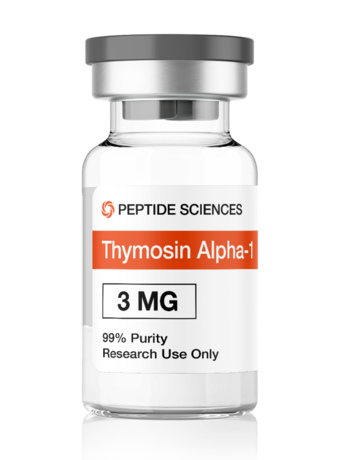Thymosin Alpha-1 is a natural regulator of immune function. Since then, it has been studied for cystic fibrosis, infections (for example, tuberculosis, cytomegalovirus), respiratory diseases, chronic hepatitis and cancer. Thymosin alpha-1 was first discovered in 1972, isolated from the tissue of the thymus gland and is a powerful modulator of immune function. You can buy it in our online store.
What is thymosin alpha 1
Thymosin alpha-1 is a natural peptide fragment that was discovered in 1972. Since then, it has been studied in clinical trials for cystic fibrosis, infections (for example, tuberculosis, cytomegalovirus), respiratory diseases, chronic hepatitis and cancer. It is currently approved for use in the fight against chronic hepatitis B and C infections in 35 underdeveloped countries.
Research of thymosin alpha-1
Thymosin Alpha-1 modulates the immune system
Thymosin alpha-1, first isolated from the tissue of the thymus gland, is a powerful regulator of immune function. The thymus is responsible for the formation of T-cells and ensuring their proper maturation. T cells are one of the most important parts of the adaptive immune system, they help the immune system remember past infections and improve the functions of other cells of the immune system, increasing their ability to fight infection.
Research on mice without a thymus gland shows that thymosin alpha-1 alone is enough to restore immune function and prevent widespread infection. The peptide acts at the most fundamental levels of the immune system, activating signaling pathways and stimulating the production of cytokines and other molecules that help coordinate the activity of various immune system cells. In other words, thymosin alpha-1 has a broad positive effect on the immune system.
One of the ways that thymosin alpha-1 can be beneficial is in the development of a vaccine. Currently, many vaccines consist of inactivated (killed) pathogens, since the introduction of live pathogens, even when they are weakened, is risky. Unfortunately, inactivated vaccines are less effective, and therefore immunity is not as strong. Thymosin alpha-1 can solve this problem by enhancing the response of the immune system to inactivated vaccines. The final results will include not only an increase in immunity, but also an increase in the duration of immunity. This can be useful, especially in the case of severe diseases such as bird flu, HIV and others.
Another way in which the ability of thymosin alpha-1 to regulate the immune system may be useful, — this is sepsis. Sepsis is a life-threatening condition caused by an excessive immune response to an infection. The ability to regulate the immune response in such conditions can save lives and prevent organ damage. Studies show that thymosin alfa-1 reduces mortality in patients with sepsis and reduces the risk of long-term complications. Although further studies are necessary, the first results suggest that thymosin alpha-1 may soon be approved as an adjuvant therapy for sepsis.
Thymosin Alpha-1 promotes nerve growth
The immune system plays a very important role in the growth, development and maintenance of the central nervous system, especially the brain of developing mammals. Studies on mice show that thymosin alpha-1 is a noticeable enhancer of neural development, and that peripheral administration of the peptide can actually improve cognitive functions. It seems that thymosin alpha-1 affects a number of genes responsible for the growth of neurons and the development of connections between neurons. The peptide changes the environment inside the nervous system, favoring growth and development, while simultaneously blocking the pathways responsible for inflammation and dysfunction of neurons. In short, thymosin alpha-1 really improves the structure and function of the brain. There is interest in using this molecule to eliminate delays in neural development, for example, associated with cerebral palsy
Thymosin Alpha-1 and hepatitis
Thymosin alpha-1 is an effective and very affordable treatment for chronic hepatitis B and C infections.
It is also an effective immune stimulator, and it can be administered simultaneously with vaccines against both viruses to increase effectiveness. Thymosin alpha-1 is currently approved for the treatment of hepatitis B and C in more than 35 countries
Research of thymosin alpha-1 and arterial pressure
A new study shows that thymosin alpha-1 blocks angiotensin-converting enzyme (ACE) and, thus, can reduce blood pressure. ACE is a common target of prescription drugs such as lisinopril in some people with high blood pressure. It has been shown that ACE inhibition not only lowers blood pressure by relaxing blood vessels, but can also reduce heart remodeling, slow the progression of atherosclerosis (plaque build-up), and improve kidney function. Unfortunately, most ACE inhibitors have a number of side effects. It is possible that thymosin alfa-1 may provide the benefits of ACE inhibition without the side effects of currently available medications.
The future of thymosin alpha-1
The potential uses of thymosin alpha-1 are too numerous to list in any reasonable overview. However, it is noteworthy that the peptide is already used in a number of countries as a legitimate medical treatment. Currently, researchers are looking for ways to increase the efficiency of the peptide and produce it faster and cheaper. There are good reasons to believe that variants of thymosin alpha-1 will be studied in clinical trials for a number of diseases in the coming years. From cancer to infection, the peptide has shown great promise as an immune system modulator with few side effects.
Thymosin Alpha-1 exhibits minimal side effects, low oral bioavailability and excellent subcutaneous bioavailability in mice. The dosage per kg for mice does not apply to humans. Buy Thymosin Alpha-1 only if you are a licensed researcher.




There are currently no reviews for this product.
Your review will be the first.
Tell other users of the site about the advantages and features of the product, share your impressions and expert opinion.